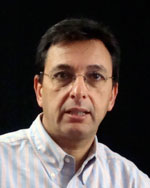
Bennie DiNardo
Deputy Managing Editor, Multimedia, The Boston Globe
Boston, Mass.
[MA-E 0301]
As I said when I first took my first full-time job, I was still surrounded by doubts like: “Who am I to say that I was a journalist?”
And I wrote a story about a man who was an insurance agent who had swindled people. And it was one of those where he did not want to cooperate, and we had to go knock on his door and the photographer was behind me and got a picture of him as he was opening the door and was closing it again.
It wasn’t so much the impact of that story – but that all the pieces came together – that I was able to tell it. I could describe the person in a way that people could understand with the right detail and the right anecdotes to bring that home to the audience. And I said. “Oh, so this is how it works.”
Before that I was struggling to write and I can remember that morning like feeling – yes, I know how to do this now.
And there was some other stories following that about an investigation in the town of Auburn – into the police department where –- That was one where there was a lot of pent-up worry and anger and frustration and the folks who were concerned weren’t able to get their story out, and I had tapped into a vein and all these people started talking to me.
And I realized the benefit that you can have to have kind of a third party comes in to tell the story who is not emotionally involved in either one of the sides or the parts of the issue. So those kinds of experiences really brought home to me the sort of special role that journalism can play in a community.


